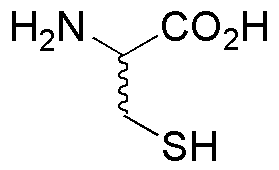DL-Cysteine is widely utilized in research focused on:
- Pharmaceutical Development: It serves as a precursor for the synthesis of various pharmaceuticals, particularly in the formulation of antioxidants and detoxifying agents that can help combat oxidative stress in the body.
- Food Industry: Used as a food additive, it enhances flavor and acts as a preservative, helping to maintain the quality and safety of processed foods.
- Cosmetic Applications: Its antioxidant properties make it a popular ingredient in skincare products, promoting skin health and reducing signs of aging.
- Biotechnology: In cell culture, it supports the growth of cells by providing essential sulfur, which is crucial for protein synthesis and overall cellular function.
- Research on Neurodegenerative Diseases: Studies indicate that it may play a role in neuroprotection, offering potential benefits in therapies for conditions like Alzheimer's and Parkinson's disease.
General Information
Properties
Safety and Regulations
Applications
DL-Cysteine is widely utilized in research focused on:
- Pharmaceutical Development: It serves as a precursor for the synthesis of various pharmaceuticals, particularly in the formulation of antioxidants and detoxifying agents that can help combat oxidative stress in the body.
- Food Industry: Used as a food additive, it enhances flavor and acts as a preservative, helping to maintain the quality and safety of processed foods.
- Cosmetic Applications: Its antioxidant properties make it a popular ingredient in skincare products, promoting skin health and reducing signs of aging.
- Biotechnology: In cell culture, it supports the growth of cells by providing essential sulfur, which is crucial for protein synthesis and overall cellular function.
- Research on Neurodegenerative Diseases: Studies indicate that it may play a role in neuroprotection, offering potential benefits in therapies for conditions like Alzheimer's and Parkinson's disease.
Documents
Safety Data Sheets (SDS)
The SDS provides comprehensive safety information on handling, storage, and disposal of the product.
Product Specification (PS)
The PS provides a comprehensive breakdown of the product’s properties, including chemical composition, physical state, purity, and storage requirements. It also details acceptable quality ranges and the product's intended applications.
Certificates of Analysis (COA)
Search for Certificates of Analysis (COA) by entering the products Lot Number. Lot and Batch Numbers can be found on a product’s label following the words ‘Lot’ or ‘Batch’.
Numéro de catalogue
Numéro de lot/série
Certificates Of Origin (COO)
This COO confirms the country where the product was manufactured, and also details the materials and components used in it and whether it is derived from natural, synthetic, or other specific sources. This certificate may be required for customs, trade, and regulatory compliance.
Numéro de catalogue
Numéro de lot/série
Safety Data Sheets (SDS)
The SDS provides comprehensive safety information on handling, storage, and disposal of the product.
DownloadProduct Specification (PS)
The PS provides a comprehensive breakdown of the product’s properties, including chemical composition, physical state, purity, and storage requirements. It also details acceptable quality ranges and the product's intended applications.
DownloadCertificates of Analysis (COA)
Search for Certificates of Analysis (COA) by entering the products Lot Number. Lot and Batch Numbers can be found on a product’s label following the words ‘Lot’ or ‘Batch’.
Numéro de catalogue
Numéro de lot/série
Certificates Of Origin (COO)
This COO confirms the country where the product was manufactured, and also details the materials and components used in it and whether it is derived from natural, synthetic, or other specific sources. This certificate may be required for customs, trade, and regulatory compliance.


